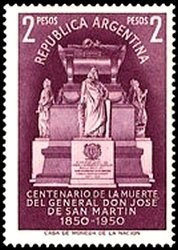Stamp: José Francisco de San Martín (1778-1850) (Argentina 1950)
José Francisco de San Martín (1778-1850) (Argentina 1950)
17 August (Argentina ) within release Death Cent. Of Gen San Martin goes into circulation Stamp José Francisco de San Martín (1778-1850) face value 2 Argentine peso moneda nacional
| Stamp José Francisco de San Martín (1778-1850) in catalogues | |
|---|---|
| Michel: | Mi:AR 575 |
| Götig and Jalil: | Göt:AR 982 |
Stamp is square format.
Also in the issue Death Cent. Of Gen San Martin:
- Stamp - José Francisco de San Martín (1778-1850) face value 20;
- Stamp - José Francisco de San Martín (1778-1850) face value 25;
- Stamp - José Francisco de San Martín (1778-1850) face value 50;
- Stamp - José Francisco de San Martín (1778-1850) face value 75;
- Stamp - José Francisco de San Martín (1778-1850) face value 1;
- Stamp - José Francisco de San Martín (1778-1850) face value 2;
Stamp José Francisco de San Martín (1778-1850) it reflects the thematic directions:
Famous People refers to the fame and public attention accorded by the mass media to individuals or groups or, occasionally, animals, but is usually applied to the persons or groups of people (celebrity couples, families, etc.) themselves who receive such a status of fame and attention. Celebrity status is often associated with wealth (commonly referred to as fame and fortune), while fame often provides opportunities to make money.
A monument is a type of structure that was explicitly created to commemorate a person or event, or which has become relevant to a social group as a part of their remembrance of historic times or cultural heritage, due to its artistic, historical, political, technical or architectural importance. Examples of monuments include statues, (war) memorials, historical buildings, archaeological sites, and cultural assets. If there is a public interest in its preservation, a monument can for example be listed as a UNESCO World Heritage Site. The Palgrave Encyclopedia of Cultural Heritage and Conflict gives the next definition of monument:
A general officer is an officer of high rank in the armies, and in some nations' air and space forces, marines or naval infantry
An anniversary is the date on which an event took place or an institution was founded in a previous year, and may also refer to the commemoration or celebration of that event. For example, the first event is the initial occurrence or, if planned, the inaugural of the event. One year later would be the first anniversary of that event. The word was first used for Catholic feasts to commemorate saints. Most countries celebrate national anniversaries, typically called national days. These could be the date of independence of the nation or the adoption of a new constitution or form of government. The important dates in a sitting monarch's reign may also be commemorated, an event often referred to as a "Jubilee".



